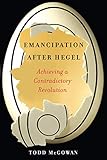Emancipation After Hegel : Achieving a Contradictory Revolution / Todd McGowan.
Material type: TextPublisher: New York, NY : Columbia University Press, [2019]Copyright date: ©2019Description: 1 online resourceContent type:
TextPublisher: New York, NY : Columbia University Press, [2019]Copyright date: ©2019Description: 1 online resourceContent type: - 9780231192705
- 9780231549929
- 193 23
- B2948 .M3175 2019
- online - DeGruyter
- Issued also in print.
| Item type | Current library | Call number | URL | Status | Notes | Barcode | |
|---|---|---|---|---|---|---|---|
 eBook
eBook
|
Biblioteca "Angelicum" Pont. Univ. S.Tommaso d'Aquino Nuvola online | online - DeGruyter (Browse shelf(Opens below)) | Online access | Not for loan (Accesso limitato) | Accesso per gli utenti autorizzati / Access for authorized users | (dgr)9780231549929 |
Browsing Biblioteca "Angelicum" Pont. Univ. S.Tommaso d'Aquino shelves, Shelving location: Nuvola online Close shelf browser (Hides shelf browser)

|

|

|

|

|

|

|
||
| online - DeGruyter Reckoning with History : Unfinished Stories of American Freedom / | online - DeGruyter Chinese Grammatology : Script Revolution and Literary Modernity, 1916–1958 / | online - DeGruyter Fear of Breakdown : Politics and Psychoanalysis / | online - DeGruyter Emancipation After Hegel : Achieving a Contradictory Revolution / | online - DeGruyter Concepts and Categories : Foundations for Sociological and Cultural Analysis / | online - DeGruyter Fearing the Worst : How Korea Transformed the Cold War / | online - DeGruyter Robert Rauschenberg : An Oral History / |
Frontmatter -- CONTENTS -- ACKNOWLEDGMENTS -- Introduction. Divided He Falls -- Chapter One. The Path to Contradiction: Redefining Emancipation -- Chapter Two. Hegel After Freud -- Chapter Three. What Hegel Means When He Says Vernunft -- Chapter Four. The Insubstantiality of Substance: Restoring Hegel's Lost Limbs -- Chapter Five. Love and Logic -- Chapter Six. How to Avoid Experience -- Chapter Seven. Learning to Love the End of History: Freedom Through Logic -- Chapter Eight. Resisting Resistance, Or Freedom Is a Positive Thing -- Chapter Nine. Absolute or Bust -- Chapter Ten. Emancipation Without Solutions -- Conclusion. Replanting Hegel's Tree -- NOTES -- INDEX
restricted access online access with authorization star
http://purl.org/coar/access_right/c_16ec
Hegel is making a comeback. After the decline of the Marxist Hegelianism that dominated the twentieth century, leading thinkers are rediscovering Hegel's thought as a resource for contemporary politics. What does a notoriously difficult nineteenth-century German philosopher have to offer the present? How should we understand Hegel, and what does understanding Hegel teach us about confronting our most urgent challenges?In this book, Todd McGowan offers us a Hegel for the twenty-first century. Simultaneously an introduction to Hegel and a fundamental reimagining of Hegel's project, Emancipation After Hegel presents a radical Hegel who speaks to a world overwhelmed by right-wing populism, authoritarianism, neoliberalism, and economic inequalities. McGowan argues that the revolutionary core of Hegel's thought is contradiction. He reveals that contradiction is inexorable and that we must attempt to sustain it rather than overcoming it or dismissing it as a logical failure. McGowan contends that Hegel's notion of contradiction, when applied to contemporary problems, challenges any assertion of unitary identity as every identity is in tension with itself and dependent on others. An accessible and compelling reinterpretation of an often-misunderstood thinker, this book shows us a way forward to a new politics of emancipation as we reconcile ourselves to the inevitability of contradiction and find solidarity in not belonging.
Issued also in print.
Mode of access: Internet via World Wide Web.
In English.
Description based on online resource; title from PDF title page (publisher's Web site, viewed 02. Mrz 2022)


